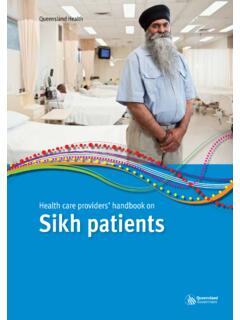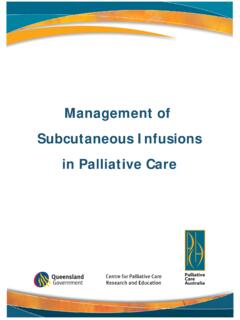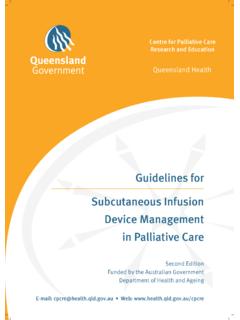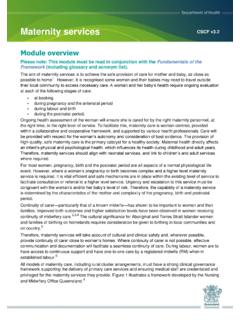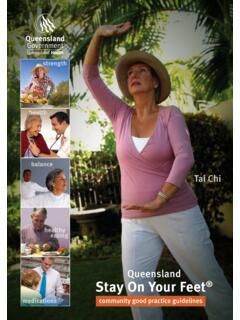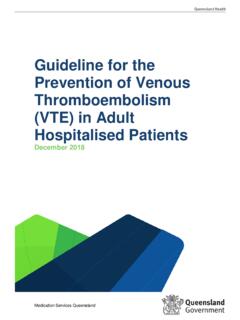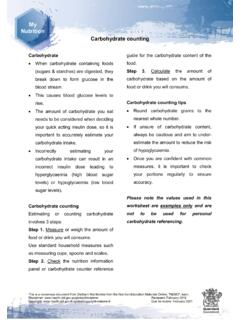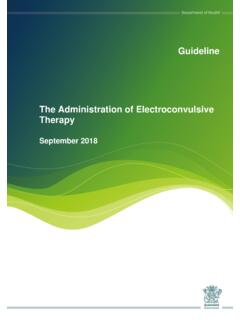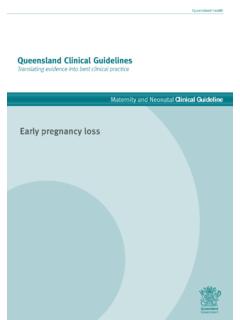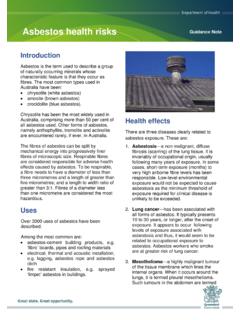Transcription of Health Care Providers' Handbook on Muslim Patients …
1 Health care providers Handbook onMuslim patientsSecond editionQueensland HealthHealth care providers Handbook on Muslim patients2 State of Queensland (Queensland Health ) 2010. This document is licensed under a Creative Commons Attribution Non-Commercial Australia licence. To view a copy of this licence, visit You are free to copy, communicate and adapt the work for non-commercial purposes, as long as you attribute Queensland Health and the Islamic Council of Queensland. For permissions beyond the scope of this licence contact: Intellectual Property OfficerQueensland Health GPO Box 48 Brisbane Queensland 4001 Email: 07 3234 1479 For further information contact: Queensland Health Multicultural ServicesDivision of the Chief Health OfficerQueensland Health PO Box 2368 Fortitude Valley BC Queensland 4006 Email: orIslamic Council of QueenslandPO Box 204 Sunnybank Queensland 4109 Email: Suggested citation:Queensland Health and Islamic Council of Queensland.
2 Health care Providers Handbook on Muslim Patients Second Edition 2010. Division of the Chief Health Officer, Queensland Health , Brisbane editionTable of contents Preface ..4 Introduction ..5 Section one: Guidelines for Health services ..6 1 Communication issues ..7 2 Interpreter services ..8 3 Patient rights ..8 4 Religious observance .. 8 5 Administration of medicines ..10 6 Medical examination .. 10 7 Hygiene .. 10 8 Maternity services ..11 9 Community Health services ..11 10 Visiting arrangements.
3 12 11 care of older persons .. 12 12 End of life issues ..12 13 Deceased Patients ..13 14 Autopsy ..13 Section two: Islamic beliefs affecting Health care ..14 1 Food beliefs ..15 2 Holy days ..15 3 Fasting ..16 4 Dress .. 16 5 Mental Health and/or cognitive dysfunction ..17 6 Embryo experimentation and stem cell research ..17 7 Transplants and organ donation ..17 8 Sexual and reproductive Health ..17 9 Death and dying .. 18 Section three: Additional resources .. 19 1 Islamic organisations .. 20 2 Queensland Health resources and contacts ..20 3 Halal information .. 21 Health care providers Handbook on Muslim patients4 PrefaceIn 1996, Queensland Health and the Islamic Council of Queensland published the Health care Providers Handbook on Muslim Patients as a quick-reference tool for Health workers when caring for Muslim Patients .
4 The Handbook aimed to help Health care providers understand the religious beliefs and practices of Muslims that could affect Health care , and provided Health care advice and resources. This second edition of the Handbook updates and expands on the topics covered in the original guide. The Handbook has three sections: Guidelines for Health services Islamic beliefs affecting Health care Additional section provides practical advice and information for Health care providers, which is designed to answer some of the more common questions about Muslim Patients and the religious practices of Islam which affect Health care . The Handbook also provides links to further information and contacts within the Islamic community of Queensland.
5 Health care providers work in an increasingly diverse environment. Those who display cross-cultural capabilities in their work use self-reflection, cultural understanding, contextual understanding, communication and collaboration to provide culturally appropriate, responsive and safe Health care1. The Handbook aims to support Health care providers by building their knowledge of the needs of Muslim Patients . The second edition of the Health care Providers Handbook on Muslim Patients was written under the guidance of an advisory committee comprising:Imam Ikraam Buksh (Islamic Society of Darra)Ms Marina Chand (Queensland Health Multicultural Services)Mr Theo Georga (Queensland Health Multicultural Services)Ms Nada Ibrahim (Griffith Islamic Research Unit, Griffith University)Dr Mohammed Khateeb (Prince Charles Hospital)Ms Madonna McGahan (Mater Health Services)Ms Suruj Noor (Princess Alexandra Hospital)Ms Amanda Parker (Logan Hospital)Ms Nicole Payne (Royal Brisbane and Women s Hospital)Imam Zeeyad Ravat (Islamic College of Brisbane)Ms Galila Abdel Salam (Islamic Women s Association of Queensland)Mr Mohammed Yusuf (Islamic Council of Queensland)
6 1 The Queensland Health Cross-Cultural Capabilities are: self-reflection, cultural understanding, context, communication and collaboration. Refer to editionIntroductionQueensland is a culturally and religiously diverse state in 2006 nearly one in five Queenslanders ( per cent) was born overseas, per cent of the population spoke a language other than English at home, and more than 129,000 people followed a religion other than Christianity. Between 2001 and 2006, the two fastest growing religions in Queensland were Hinduism and Islam. Figures from the 2006 census show there are more than 20,000 Muslims living in Queensland. Anecdotal information and community feedback indicate that the true figure is likely to be significantly increasing cultural, linguistic and religious diversity in the Queensland population means that to be safe, Health services need to be culturally appropriate and responsive.
7 Research indicates a strong link between cultural incompetence, and poor quality Health outcomes and significant risks2. Personal level of adherence Islam is a universal religion which is practiced in almost all countries around the world. A follower of Islam is called a Islam places responsibility on the individual to practice his or her religion, there are personal and cultural variations that make it difficult to provide definitive rules and regulations that apply to all Muslim Patients . A Muslim from West Africa may have a slightly different way of observing Islam when compared to a Muslim from Bosnia, Indonesia or Iran. Because of these personal and cultural variations, it is important that Health care providers consult the patient about their personal level of religious , Muslim Patients should not be regarded as a special group that require additional attention from Health care providers.
8 Due to the Islamic belief that all events, including Health events, are the will of God, Muslim Patients may be more likely to display acceptance of difficult circumstances and be compliant with the instructions of Health care of lifeAlthough there are many variations in how Islam is practiced, there is one requirement that is common to all Muslims the preservation of life overrides all guidelines, rules and restrictions. While Health care providers should endeavour to provide treatment that does not conflict with religious practices, in life-threatening situations, Islam allows exceptions to its Johnstone, Megan-Jane and Kanitsaki Olga (2005) Cultural Safety and Cultural Competence in Health care and Nursing.
9 An Australian Study, RMIT University, for Health services Guidelines for Health services Guidelines for Health services Guidelines for Health services Guidlines for Health ser 1 Guidelines for Health services7 Guidelines on working with interpreters a comprehensive guide for Health care providers on how to work with interpreters Ward Communication Tool a booklet which features 30 words commonly used in Health care , translated in 30 languages, with an accompanying graphic. More information about communicating with Patients from a culturally and linguistically diverse background is contained in the Queensland Health Multicultural Clinical Support Resource folder.
10 1 . Communication issuesThe 2006 census showed that more than 70 per cent of Queensland s Muslim population was born overseas, with the majority of people coming from a non-English speaking country. Queensland Health staff should be aware that many Muslim Patients may not be proficient in English. If a patient is assessed to have inadequate English, Health care providers must engage a professional interpreter. Queensland Health provides a statewide interpreter service that can provide onsite, telephone and video remote interpreters in more than 100 languages. Other staff resources include: Language Identification Card a card/poster which can assist Health care providers to identify more than 60 languages Guidelines for Health services Guidelines for Health services Guidelines for Health services Guidlines for Health ser care providers Handbook on Muslim patients82.
